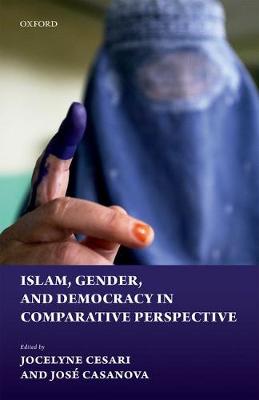
Stock image for illustration purposes only - book cover, edition or condition may vary.
Islam, Gender, and Democracy in Comparative Perspective
Jocelyne; Ca Cesari
€ 157.96
FREE Delivery in Ireland
Description for Islam, Gender, and Democracy in Comparative Perspective
Hardcover. This collection reframes the debate around Islam and women's rights within a broader comparative literature that examines the complex and contingent historical relationships between religion, secularism, democracy, law, and gender equality. Editor(s): Cesari, Jocelyne; Casanova, Jose. Num Pages: 336 pages. BIC Classification: HRHC; HRHP; HRHT; JHBC. Category: (G) General (US: Trade). Dimension: 234 x 153. .
The relationship between secularism, democracy, religion, and gender equality has been a complex one across Western democracies and still remains contested. When we turn to Muslim countries, the situation is even more multifaceted. In the views of many western commentators, the question of Women Rights is the litmus test for Muslim societies in the age of democracy and liberalism. Especially since the Arab Awakening, the issue is usually framed as the opposition between liberal advocates of secular democracy and religious opponents of women's full equality. Islam, Gender, and Democracy in Comparative Perspective critically re-engages this too simple binary opposition by reframing the debate around Islam and women's rights within a broader comparative literature. Bringing together leading scholars from a range of disciplines, it examines the complex and contingent historical relationships between religion, secularism, democracy, law, and gender equality. Part One addresses the nexus of religion, law, gender, and democracy through different disciplinary perspectives (sociology, anthropology, political science, law). Part Two localizes the implementation of this nexus between law, gender, and democracy and provides contextualized responses to questions raised in Part One. The contributors explore the situation of Muslim women's rights in minority conditions to shed light on the gender politics in the modernization of the nation and to ponder on the role of Islam in gender inequality across different Muslim countries.
Product Details
Publisher
Oxford University Press
Format
Hardback
Publication date
2017
Condition
New
Weight
28g
Number of Pages
320
Place of Publication
Oxford, United Kingdom
ISBN
9780198788553
SKU
V9780198788553
Shipping Time
Usually ships in 15 to 20 working days
Ref
99-11
About Jocelyne; Ca Cesari
Jocelyne Cesari is Professor of Religion and Politics at the University of Birmingham and Senior Research fellow at Georgetown University's Berkley Center where she directs the Islam in World Politics Program. She is an adjunct Professor at the Harvard Divinity School and directs the interfaculty Program on Islam in the West at Harvard University. Her publications include The Islamic Awakening: Religion, Democracy and Modernity (Cambridge University Press, 2014) and Why the West Fears Islam: An Exploration of Islam in Western Liberal Democracies (Palgrave, 2013). She is also the editor of The Oxford Handbook of European Islam (Oxford University Press, 2015). Jose Casanova is Professor at the Department of Sociology at Georgetown University, and heads the Berkley Center's Program on Globalization, Religion, and the Secular. He has published works in a broad range of subjects, including religion and globalization, migration and religious pluralism, transnational religions, and sociological theory. He is the author of Public Religions in the Modern World (University of Chicago Press, 1994).
Reviews for Islam, Gender, and Democracy in Comparative Perspective
[T]he book succeeds in problematizing the simplistic association of women's equality with secularism. Its essays present a wide swath of experiences which are diverse enough to demonstrate why the targeted bifurcation is too simplistic (as it is in Malaysia, Indonesia, Bangladesh, and Senegal) without ignoring contexts in which it sometimes appears applicable (as it does to varying extents in Iran, India, Morocco, and Tunisia)... It would work well as a supplement in undergraduate or graduate sociology, anthropology, or political science courses that discuss religion and gender, although instructors should select chapters judiciously to ensure representation of the breadth of perspectives from its case studies that is necessary to problematize its target simplifications.
Rachel Jonker, Reading Religion
Rachel Jonker, Reading Religion
